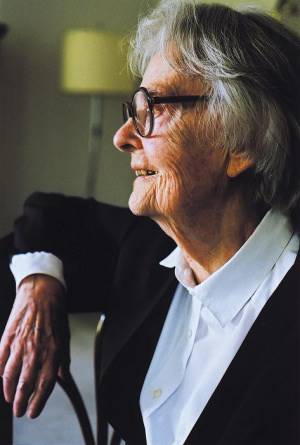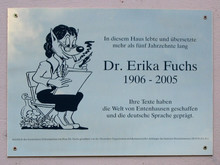
Erika Fuchs
(07.12.1906, Росток — 22.04.2005, Мюнхен)
немецкая переводчица
В честь её названа разновидность глагола «Эрикатив»
При переводе на иностранный язык можно в лучшем случае приблизиться к тексту оригинала, чего нельзя сказать о самой знаменитой немецкой переводчице комиксов. До того как в 1951 году Эрика Фукс приступила к переводу комиксов Диснея, она за всю жизнь не прочитала ни одного комикса, хотя ей на тот момент исполнилось уже 45 лет. В послевоенное время она искала дополнительный заработок, чтобы прокормить семью, и подала заявку на вакансию переводчика в издательство Reader’s Digest, однако на перевод ей смогли предложить только серию комиксов «Микки Маус».
Эрика согласилась, и это стало ее основным занятием на ближайшие полвека. Ее тексты получили известность, потому что она придумала персонажам новые, немецкие имена: Dagobert Duck вместо Scrooge McDuck (в официальном русском переводе — Скрудж МакДак), Panzerknacker вместо Beagle Boys (рус. братья Гавс), Daniel Düsentrieb вместо Gyro Gearloose (рус. Винт Разболтайло). Зачастую переводчица полностью отступала от оригинала и расцвечивала текст абсолютно новыми аллюзиями и игрой слов.
«Прыг-прыг», «кусь-кусь»
Помимо всего прочего, Эрика Фукс изобрела новый прием: наряду с обычными для комиксов звукоподражаниями, она стала сопровождать действия персонажей словами, полученными путем усечения глагола, обозначающего данное действие (что-то вроде «прыг-прыг», когда персонаж прыгает, или «кусь-кусь», когда кого-то кусает собака). Эта идея нашла своих последователей и даже стала претендовать на звание главной отличительной особенности языка комиксов в Германии. В результате у некоторых авторов чрезмерное пристрастие к данному приему вылилось в довольно странную форму: например, «плак-плак» для выражения печали. Для этой новой грамматической формы почитатели Эрики Фукс придумали название «эрикатив».
Уже в преклонном возрасте Эрика Фукс получила две литературные премии, которые никогда ранее (и никогда после этого) не присуждались авторам текстов комиксов: кельнскую премию имени Хаймито фон Додерера и премию имени Росвиты Гандерсгеймской. Но ей и без этого было хорошо известно, как высоко ее труд ценят читатели. В отличие от своей коллеги Гудрун Пенндорф, которая в соавторстве с Адольфом Кабатеком перевела комиксы об Астериксе, Эрика не затевала судебную тяжбу, чтобы получить процент прибыли от многочисленных переизданий. Гудрун Пенндорф выиграла дело, но переводить комиксы ей больше не предлагали.
Андреас Платтхаус
редактор отдела фельетонов в газете Frankfurter Allgemeinen Zeitung (FAZ).
From Wikipedia, the free encyclopedia
|
Memorial plate on Erika Fuchs's house in Schwarzenbach, Germany, donated in 2006 by the German D.O.N.A.L.D. The inscription reads in German, "In this house, Dr. Erika Fuchs (1906-2005) lived and translated for more than five decades. Her texts have profoundly crafted the world of Duckburg and enriched the German language." |
Erika Fuchs, née Petri (7 December 1906 in Rostock – 22 April 2005 in Munich), was a German translator. She is largely known in Germany due to her translations of American Walt Disney cartoons, especially Carl Barks's stories about Duckburg and its inhabitants.
Many of her creations (re)entered the German language, and her followers today recognize her widely quoted translations as standing in the tradition of great German-language light poetry such as by Heinrich Heine, Wilhelm Busch, and Kurt Tucholsky. Unlike the English originals, her translations included many hidden quotes and literary allusions. As Fuchs once said, "You can't be educated enough to translate comic books".
Life
Born into a well to do large family, Fuchs spent most of her childhood and youth in Belgard in Pomerania, where in 1921 she was the first girl to be admitted to the boys' Gymnasium (grammar school) - she passed her Abitur exam there in 1926. She went on to study art history in Lausanne, Munich and London and took her degree in 1931–1932. In 1935 her dissertation was entitled "Johann Michael Feuchtmayr: Ein Beitrag zur Geschichte des deutschen Rokoko" - "a contribution to the history of German Rococo". It received a summa cum laude. Her husband, Dipl.-Ing. Günter Fuchs (1907–1984), was an industrialist and inventor and tried various inventions at home.
After the Second World War she worked as a translator for the German edition of Reader's Digest, before carrying out translating jobs for other American magazines. In 1951, she became chief editor of Disney's newly founded German Micky Maus magazine, where she worked until she retired in 1988.
Work
Many of her creations as translator of Carl Barks comics entered or reentered the German language. The phrase "Dem Ingeniör ist nichts zu schwör" - "nothing is too hard for an engineer" but with the vowels (umlauts) at the end of "Ingenieur" and "schwer" altered to make them rhyme amusingly was often attributed to Fuchs, as she had made it Gyro Gearloose's German catchphrase. However, it was originally based on a song written by Heinrich Seidel. A somewhat more clumsy version of the phrase was the first verse of "Seidels Ingenieurlied" ("The Engineer's Song") and had been used by fraternities at technical universities for the German equivalent of The Ritual of the Calling of an Engineer. Fuchs had heard it from her husband, who was an engineer himself.
A classical Fuchs is as well to be found in her translation of Barks's 1956 story "Three Un-Ducks" (INDUCKS story code W WDC 184-01), where Huey, Dewey, and Louie speak the oath "Wir wollen sein ein einig Volk von Brüdern, in keiner Not uns waschen und Gefahr" ("We Shall be a United People of Brethren, Never to Wash in Danger nor Distress"), thereby parodying Friedrich Schiller's version of the Rütlischwur from his 1804 play William Tell in a suitable way.
She also used verbs shortened to their stems not only to imitate sounds (onomatopoeia), such as schluck, stöhn, knarr, klimper (gulp, groan, creak, chink/jingle), but also to represent soundless events: grübel, staun, zitter (ponder, goggle, tremble). The word for these soundwords in German is now an Erikativ, a tongue-in-cheek word utilizing Fuchs's first name, made to resemble grammatical terms such as Infinitiv (infinitive), Indikativ (indicative mood), Akkusativ (accusative case), etc. Erikative are commonly used in Internet forums and chatrooms to describe what people are doing as they write, which has become the common German form of the Internet slang behavior known in English as emoting. English examples: *ducks*, *runs away*, etc. The Erikativ is the German form of those (*duck*, *weglauf*, respectively).
Honors and legacy
In 2001 she was awarded the Heimito von Doderer Prize for Literature for her work on Duckburg. Until her death at 98, Erika Fuchs was an honorary member of the "D.O.N.A.L.D." ("Deutsche Organisation nichtkommerzieller Anhänger des lauteren Donaldismus" or the "German Organization of Non-commercial Devotees of the true Donaldism"). Some members of this organisation (Patrick Bahners and Andreas Platthaus) occasionally sprinkled Fuchsian tidbits amongst the headlines of the serious FAZ newspaper, although these were often recognisable only by those in the know.
In 1991, painter Gottfried Helnwein set a portrait of Fuchs among his work Die 48 bedeutendsten Frauen des Jahrhunderts (48 Most Important Women of the Century). The work is now to be found at Museum Ludwig in Cologne.
A comic museum in her hometown of Schwarzenbach an der Saale, named after Erika Fuchs, saw its opening on August 1, 2015.
External links
См. ► Фукс — 20 век. Однофамильцы

